Afghanistan remains one of the most impoverished Islamic nations, facing severe hardship, particularly in these…
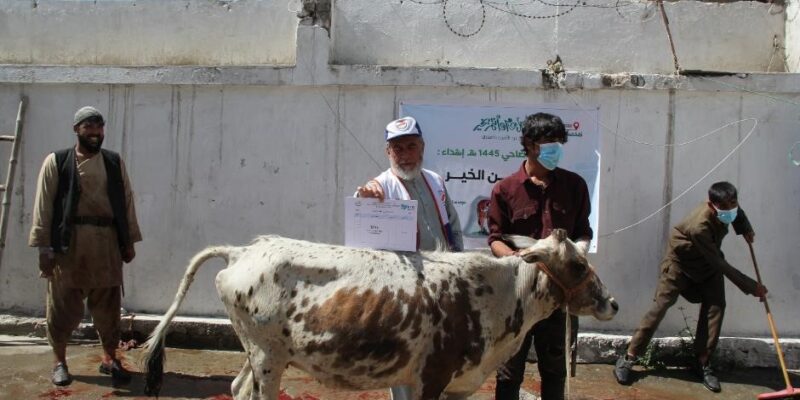
Ehsas Welfare and Social Services Organization (EWSSO) slaughtering of 2 cow in Kabul on June 18, 2024
Project Overview:
Ehsas Welfare and Social Services Organization (EWSSO) successfully implemented project of the Qurbani (Sacrificing of Animals), which is a Sunnah action in Islam. The project was conducted Kabul city, where we successfully slaughtered 2 cows. The meat was then distributed to 60 Households, which each person receiving 3 kg of meat. This initiative was made possible through a generous grant from the IHO organization. In addition, this initiative aimed to provide much-needed nutrition to vulnerable communities during the Qurbani period, ensuring that they could partake in the religious observance despite their challenging circumstances.
This project was implemented from June 18, 2024, in Kabul, Afghanistan.
Achievements:
- Successful Slaughter and Distribution: All 2 cows were slaughtered and the meat was distributed efficiently to the intended beneficiaries.
- Community Engagement: The project fostered a sense of community by involving local leaders and volunteers in the distribution process.
- Nutritional Support: Provided 180 kg of meat, significantly improving the dietary intake of 430
- Religious Fulfillment: Enabled families to participate in the Qurbani ritual, fulfilling an important religious duty.
Challenges:
- Natural Disasters: Afghanistan faced severe flooding during the project period, which impacted the availability and cost of animals.
- High Costs and Scarcity: Due to the floods, many people lost their livestock, making animals both expensive and scarce.
- Logistical Issues: The adverse weather conditions complicated transportation and distribution logistics.
Immediate impact of this project
The distribution of meat by the Ehsas Welfare and Social Services Organization (EWSSO), funded by the IHO organization, has had a significant positive impact on the target groups in Afghanistan.
Changes Observed:
- Improved Nutrition and Health:
- The immediate provision of meat has considerably improved the nutrition and hunger levels of 430
- Families reported better overall reduction in hunger and malnutrition, which is critical during these challenging times.
- Alleviation of Economic Stress:
- The Meat alleviated the financial burden on low-income households, allowing them to allocate limited resources to other essential needs such as healthcare and education.
- This temporary economic relief has helped families stabilize their situations and reduce the stress and anxiety associated with extreme poverty.
- Community Solidarity and Support:
- The project fostered a sense of solidarity within the community, showing that support is available even in the most challenging circumstances.
- This sense of community support has strengthened social bonds and encouraged a culture of helping one another, particularly among the most vulnerable groups. Many people from the local communities helped as volunteers in the distribution processes.
Project Contributions:
- Effective Resource Allocation:
- By targeting the most vulnerable populations, the project ensured that resources were efficiently allocated to those in dire need, maximizing the impact of the aid provided.
- The careful selection and distribution process ensured that the aid reached the intended beneficiaries without significant delays or losses.
- Enhanced Organizational Capability:
- Despite facing severe challenges, including natural disasters and governmental delays, the successful execution of this project has enhanced EWSSO’s capability to manage and implement aid projects under difficult conditions.
- The experience gained from overcoming these obstacles will improve future project planning and execution, making the organization more resilient and effective.
- Increased Awareness and Support:
- The visible impact of the project has increased awareness about the critical issues facing low-income households in remote areas of Afghanistan, which will help attract further support and collaboration from other organizations and stakeholders.
- The support from IHO and the successful implementation of the project have set a precedent for future initiatives, encouraging more partnerships and funding opportunities.
In summary, the Qurbani project has significantly improved the lives of the target groups by providing essential nutrition, reducing hunger and economic stress, and fostering a sense of community support. The project’s success under challenging conditions has also strengthened EWSSO’s operational capabilities and increased awareness of the ongoing needs in Afghanistan.
Beneficiary Feedback
Feedback Collection:
Feedback was collected through a direct interview with beneficiaries, local leaders, and volunteers involved in the project.
Positive Feedback:
· Nutritional Benefits: Many beneficiaries expressed gratitude for receiving high-quality meat, which significantly improved their meals.
· Community Support: The initiative strengthened community bonds and was appreciated for bringing people together.
· Religious Satisfaction: Beneficiaries were pleased to participate in the Qurbani ritual, which is an important religious practice.
Informing Adjustments:
- Government Coordination: To address the challenges related to governmental interference, we are working on establishing clearer communication channels and more effective collaboration with government officials to reduce bureaucratic delays.
- Increase Funding and Donations: Seek additional funding from donors, charities, and organizations to expand resources. This can be done through targeted campaigns, partnerships, and grants.
The feedback we received has been invaluable in refining our approach and enhancing the effectiveness of our future projects, ensuring that we can better serve the communities in need.
Reflections and Lessons Learned
Share key insights gained during the grant period and how you plan to apply this knowledge, such as improving service delivery and stakeholder coordination.
Key Insights:
1. Resilience in Adversity:
- The experience of navigating severe flooding and bureaucratic delays highlighted the resilience and dedication of our team. This project reaffirmed the importance of being adaptable and prepared for unexpected challenges.
2. Effective Communication:
- Clear and consistent communication with beneficiaries and stakeholders proved crucial. Gathering and addressing feedback helped us understand the immediate needs and adjust our strategies accordingly.
3. Government Relations:
- The project underscored the necessity of improving our coordination with government agencies to minimize delays and interference. Establishing stronger relationships and clearer communication channels with governmental bodies is essential.
1. Severe Flooding in Ghor Province:
Future Activities
- Expanding Reach: Increase the scope of future projects to reach more beneficiaries and cover additional areas affected by natural disasters.
- Community Engagement: Continue to engage local leaders and volunteers to improve project implementation and distribution processes.
To continue and expand upon the work funded by IHO, we have outlined several future activities aimed at providing ongoing support and development for affected communities in Afghanistan. Our plans are designed to ensure sustainability and resilience, regardless of whether we receive further funding from IHO.
Project Outcomes
Ehsas Welfare and Social Services Organization (EWSSO) distributed 180 kg meat for needy families in Kabul – Afghanistan.
Contents/items
| Beneficiaries | Meat for each Families | Item | No. |
| 60 Households | 3 kg | Qurbani Meat | 1 |
| A total of 180 kg meat
|
|||
Beneficiary Overview
| Number of Direct beneficiaries | Total Meat Weight | #of Cows Slaughtered | Locations | # |
| 60 | 180 | 2 | Kabul | 1 |
| 60 | 180 | 2 | Total | |
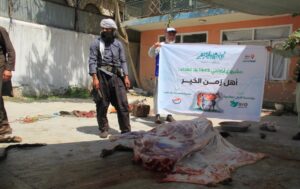
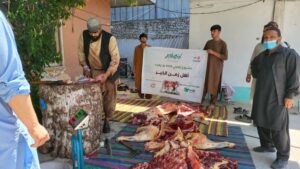
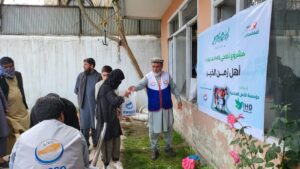

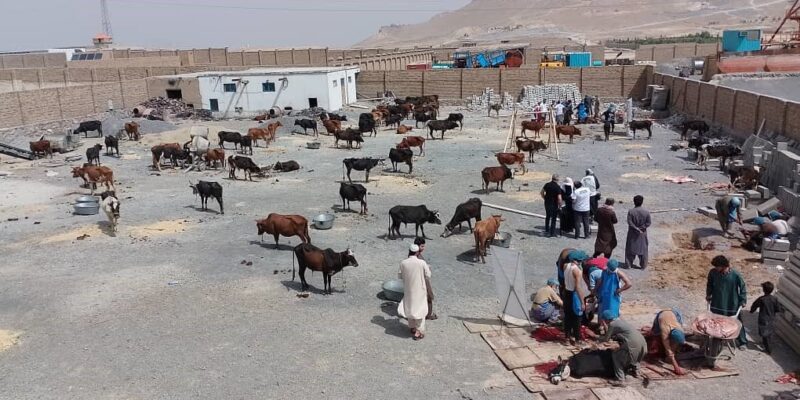
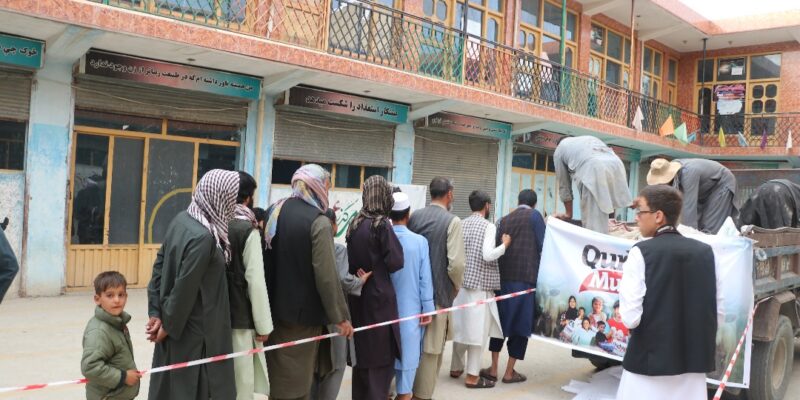
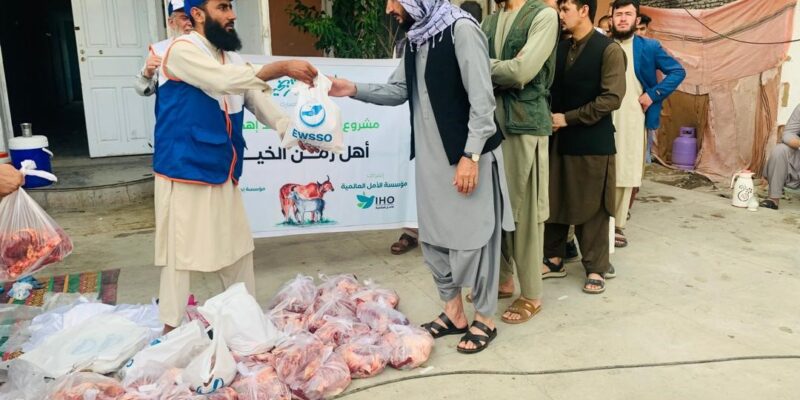
This Post Has 0 Comments